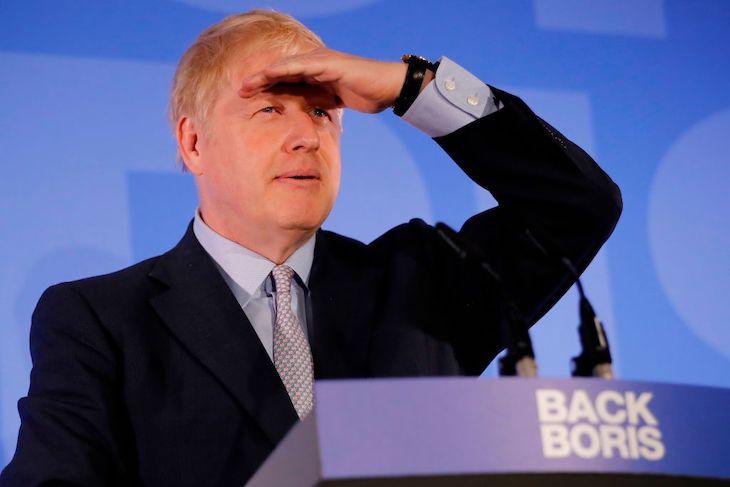You don’t have to be a conspiracy theorist to look at recent media coverage of the Tory leadership race and conclude that Bois Johnson is a bit scared of Rory Stewart. Johnson’s fiends and surrogates have been training their fire on Stewart since the weekend, sometimes subtly and sometimes not.
This started when Matt Hancock dropped out, putting his backers in play. Then Stewart’s performance in Sunday’s Channel 4 debate convinced a number of his colleagues that he could survive the second ballot and thus qualify for a BBC debate tonight. A debate that Johnson has reluctantly agreed to be in.
Reluctantly because the entire Johnson strategy in the race is about avoiding engagements where he could be bloodied. As the overwhelming favourite, this is his to lose. Why take risks? People (and journalists) might not like it, but the Johnson approach is narrowly rational. If you have a winning lottery ticket, would you put it safely in your pocket and walk slowly to the prize office, or run headlong waving the ticket in the breeze?
But the premiership isn’t a financial fortune. It’s not something you win, bank and keep. It’s something you fight for every day after the day you get it. This will be especially true of the next PM: with no majority and a ticking clock on Brexit, it’s perfectly possible the next premiership will be shorter than Theresa May’s.
Assuming – and almost everyone at Westminster still is – that Johnson is the next PM, he will face a political challenge arguably unprecedented in peacetime. To keep his central promise of Brexit by 31 October, he’ll have barely three months to either strike a deal with the EU that the EU says is impossible, sell the existing deal to a party and parliament that have rejected it three times, or deliver a no-deal exit that Parliament is intent on preventing.
A lot of people think that’s impossible. Hence all the talk of another early election or another referendum.
But whatever path Prime Minister Johnson takes, he will need to take people with him. May’s Brexit strategy after the 2017 election was broadly sensible but woefully sold. Her deal was far from perfect but it could easily have passed the Commons under a more persuasive leader. Even Johnson himself voted for it once: a majority was quite possible.
Johnson is asking his party to take on trust his ability to do better than May and achieve that seemingly impossible task on Brexit. He hasn’t even said how he’d do it, other than to go back to Brussels and crack a few gags in the hope that the EU27 finally fall for his brand of charm.
If that’s all he has, if there really is no secret plan of extravagant cunning to be revealed on the Downing Street step (and I don’t believe there is) then Prime Minister Johnson will start the job under a bombardment of questions and doubt, and the shelling will only get heavier.
Which brings us back to Rory Stewart. He has shown many talents in his insurgent campaign, not least the (surprisingly unusual among his peers) ability to talk to other human beings in a way that makes them think he might just be a member of the same species. But the thing he’s done that is most important, most valuable, is ask questions.
Some of his own answers to those questions are a bit less than convincing (I agree with him about sticking with the May deal, but I’m not sure how he’d get it passed, and the ‘citizens’ assembly’ he’d then assemble doesn’t do it for me).
But that matters less than the fact he’s asking those questions of others: what’s your plan? How will you do the things you say you’ll do? Can we trust you to keep your word?
These are the questions Johnson has been reluctant to answer and the questions Stewart will try to ask him in that BBC debate assuming, as looks likely, that he gets the 33 votes he needs to stay in the contest.
But in a way, it doesn’t matter if Stewart doesn’t make it to the debate. It’s not as if losing candidates cease to exist. Even if he’s sacked from a Johnson Cabinet, Stewart will remain an MP and retain his ability to talk to people, to mobilise a part of the electorate, and to ask questions. He only needed an iPhone, some charm and a bit of imagination to disrupt the Tory leadership race and overturn the Westminster consensus that he was just an eccentric vanity candidate. The skills and profile he has developed during this election mean he will have a voice after it, and all the signs are that he would use that voice to ask questions of Prime Minister Johnson, from the backbenches and from the pavements.
Boris Johnson is the superpower of the Tory contest. Rory Stewart is the insurgent, the candidate tapping into something outside the usual Tory territory. If you’re a big power, you can try to ignore insurgencies and you can try to annihilate them, but history suggests that neither really works. Eventually you have to sit down and talk.
Rory Stewart and his guerrilla campaign raise a lot of questions, for the Conservatives as whole and for Boris Johnson especially. Whatever happens in the leadership race, those questions aren’t going to go away: sooner or later, they will have to be answered. And given how little time Boris Johnson might have as PM, the sooner he shows that he can answer them the better.
Ignoring your problems and hoping they’ll go away is no way for a grown-up to behave, let alone one who wants to lead a country.







Comments